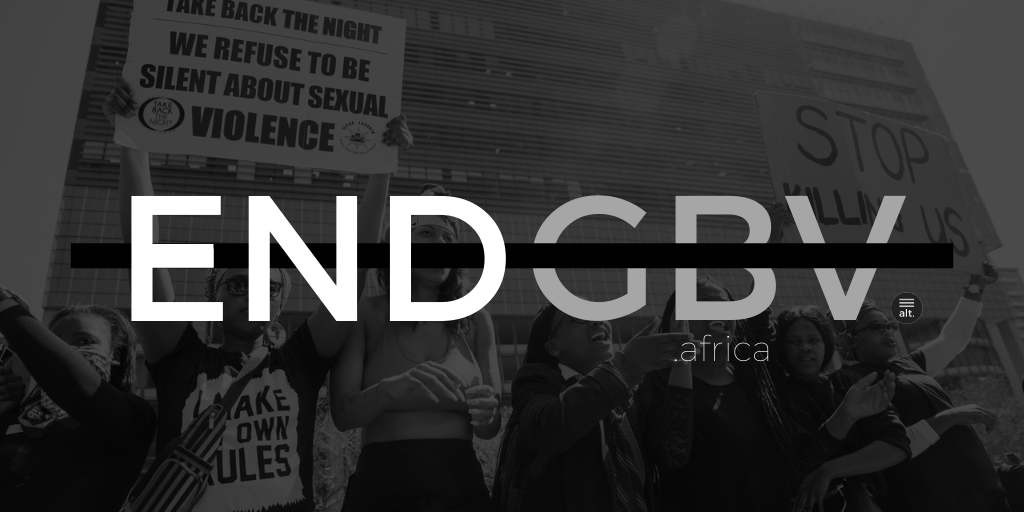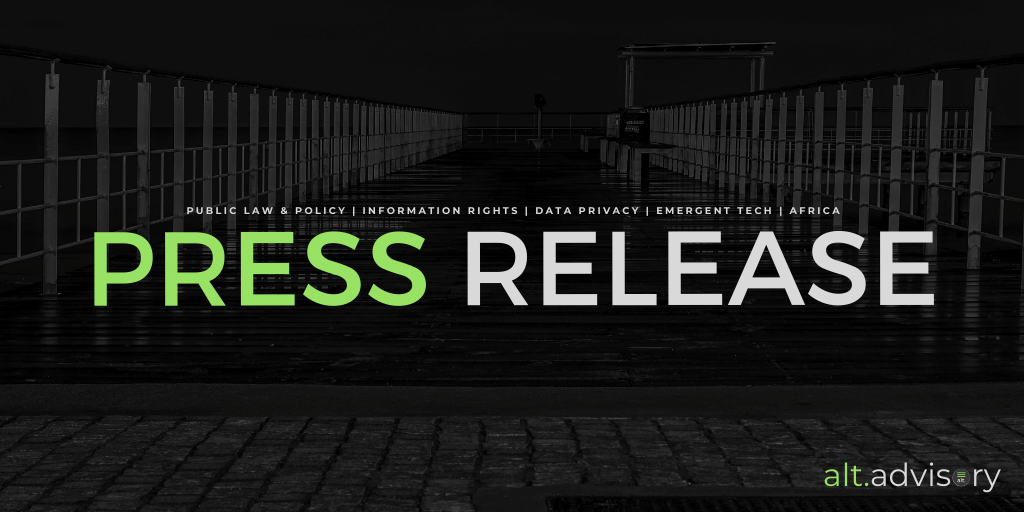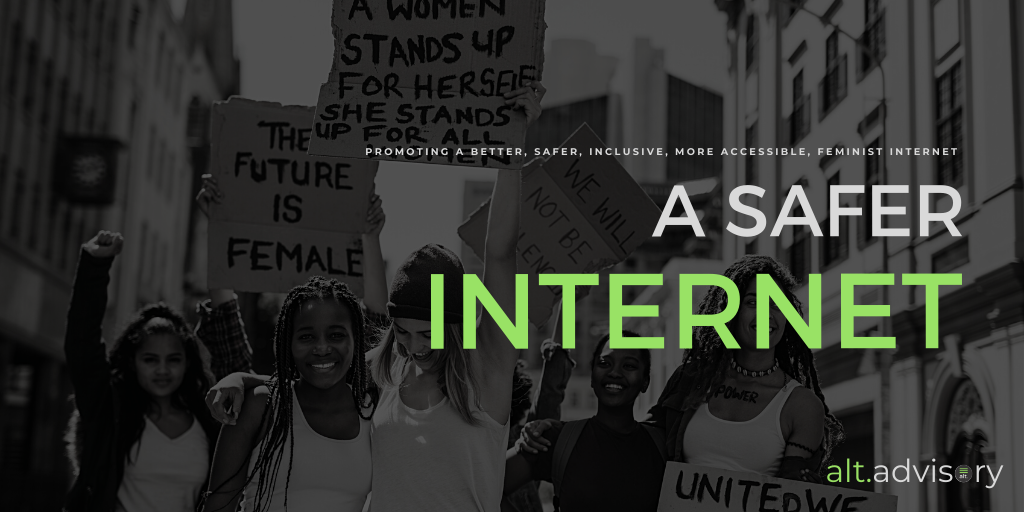Multi-stakeholder collective calls for responsible approach to regulating domestic violence facilitated by technologies
While the Fourth Industrial Revolution might introduce a number of opportunities for many South Africans, it is also accompanied by a plethora of risks as far as domestic violence and abuse are concerned. With this in mind, a multi-stakeholder collection of civil society activists, technologists, policymakers, researchers, and feminists are raising awareness of the evolving nature of domestic violence as a result of the growing prevalence of information and communication technologies (ICTs) in South Africa and beyond.
The group – consisting of members from Research ICT Africa, the Association for Progressive Communications, ALT Advisory, and Feministing While African – will be making a public submission to Parliament’s Portfolio Committee on Justice and Correctional Services in response to the Domestic Violence Amendment Bill (the Bill), on Wednesday 21 October 2020.
In the submission, the group will argue that while the proliferation of online harms, or harms facilitated, abetted, or aggravated by the Internet, social media (e.g., Facebook, Snapchat, Twitter, or TikTok) and the use of other ICTs, is indeed a practical challenge that has grown increasingly prevalent over the last two decades, the Internet and other ICTs also introduce a number of opportunities for South Africans. Policymakers therefore have to strike a careful balance between protection and empowerment, also as far as dealing with domestic violence aided, abetted or aggravated by ICTs is concerned. Owing to the prevalence of emerging technologies and the potential for harm, violence and abuse in the digital environment for example the non-consensual distribution of intimate images by intimate partners, the group will urge Parliament to ensure that the Bill reflects these emerging and developing challenges to enable victims and survivors of domestic violence, both on- and offline, to benefit from the maximum protection from domestic abuse that the law can provide.
More specifically, the oral submission the group will make on Wednesday follows on a written submission made earlier this month and available online. These submissions encompass three key issues, namely: ensuring that the Bill adopts a nuanced and evolving understanding of online domestic violence and domestic violence aided, facilitated or abetted by ICTs; reporting responsibilities in relation to directions; and the need for data protection requirements in respect of the integrated electronic repository for domestic violence protection orders.
“For anyone still in doubt, the COVID-19 pandemic has confirmed the growing importance of ICTs like the Internet for our everyday lives – crucial to everything from continuing schooling, working, or even checking symptoms online,” said Anri van der Spuy, PhD fellow at Research ICT Africa. “While only about a half of South Africans are online today, it is important that policymakers (and private sector actors like social media companies) take appropriate steps to ensure that those people who are online, along with those who are yet to come online in the months and years to come, are able to benefit from the risky opportunities of the Internet and other technologies.”
“The image of the perpetrator of online harms has changed over time. It isn’t the person who sits in some basement with multiple computer screens and advanced capabilities. We no longer exist in contexts that require an individual to be a tech savant in order to cause harm to victims and survivors of gender-based violence. All a person needs is a basic smartphone. Because of this, the Domestic Violence Act has to respond to this new reality in order for it to be effective,” said Mutondi Mulaudzi, Gender and law researcher and PhD Candidate based at UNISA and WITS University.
Samantha Malunga, Research Associate at the AIDS and Society Research Unit, UCT and member of Feministing While African, said: “More and more minors are accessing online spaces unsupervised due to the move to have classes online during lockdown. With many households in South Africa sharing only one Internet-accessible device – usually a smartphone – it is imperative that online spaces become safer for all who use them so that children and young people are not exposed to gender-based violence online in the form of unsolicited sexual images, messages, or advances. With many parents and caregivers having fewer digital skills, it is difficult to supervise the online spaces their children access and keep them safe and this is one place where the Bill can step in and help”.
“The same digital technology relied on to document and report gender-based domestic violence may be used to perpetrate it. The guarantees for safety offline must be extended to digital technologies to guard against online gender-based violence and ensure they can be used as part of the solution to document and report gender-based violence”, said Chenai Chair, tech and gender policy researcher and co-coordinator of Feministing While African.
“This law reform process provides an exciting opportunity for the enhanced protection against domestic violence, both on and offline. As we see new forms of violence emerge, technological advancements, and increased access to the Internet, we need to ensure that all affected persons, victims and survivors of domestic violence, both on- and offline, are afforded the maximum protection from domestic abuse that the law can provide. Through these submissions, we hope to highlight that need for our laws to be responsive to contemporary and evolving challenges,” Tina Power, an associate at ALT Advisory said.
“When intimate partners or former intimate partners share intimate images, especially of young people, without consent, which happens far too frequently, the law should treat this as a form of domestic violence, rather than re-victimising the person whose images are shared by treating the victim as having created pornography. The amendments should address this problem,” said Dr. Andrew Rens, Research ICT Africa.
Read the written submission here.
About the organisations that contributed to the joint submission:
Research ICT Africa (RIA), a regional digital policy and regulation think tank based in Cape Town and active across Africa and the global South. RIA conducts research on digital economy and society that facilitates evidence-based and informed policymaking for improved access, use and application of information and communication technologies (ICTs) for social development and economic growth. RIA also has a dedicated digital policy unit which specialises in Internet governance, digital rights, cybersecurity, gender, innovation (including artificial intelligence and the Internet of Things), and data justice. Understanding the needs and digital challenges of vulnerable and marginalised communities – including women, youth, children, the elderly, and people in rural areas, for example – form an integral part of RIA’s work. For more about RIA, please visit: researchictafrica.net.
The Association for Progressive Communications (APC), an international network of civil society organisations founded in 1990, dedicated to empowering and supporting people working for peace, human rights, development and the protection of the environment, through the strategic use of ICTs, including the Internet. APC has worked to build a world in which all have easy, equal and affordable access to the creative potential of ICTs to improve their lives and create more democratic and egalitarian societies. The APC Women’s Rights Programme (APC WRP) has worked for over a decade to render visible the impact of online gender-based violence (GBV) on women’s rights. Working with women’s organisations, we advocate to identify, monitor, analyse and combat uses of the internet and digital technologies that are harmful to women and marginalised communities. Additionally, we have advocated for Internet policy and regulation that enable the expression, protection and promotion of human rights, women’s rights, and the rights of people of diverse sexualities to both states and private sector actors. For more about APC, please visit, www.apc.org.
ALT Advisory (ALT), a public interest advisory firm, based in South Africa, with experience in domestic, regional and international human rights law and litigation. We assist a range of clients with advisory, research, training and technology services in the following practice areas: (i) public law; (ii) information rights; (iii) data privacy; (iv) emergent technology; and (v) social innovation. Moreover, ALT Advisory works in association with Power Singh Inc., a duly registered South African law firm, that also offers public interest litigation services, including a full range of legal services relating to sexual violence and harassment. ALT seeks, in all instances, to act in the public interest, and has the promotion and protection of human rights, both off- and online, as our overarching aim. We pride ourselves in providing quality services to our clients, timeously and effectively, that are individually tailored to ensure that our clients are best able to fulfil their own mandate through the assistance provided. For more about ALT, please visit altadvisory.africa.
Feministing While African (FWA) is a community and network of feminists across Africa and the African diaspora organising on digital platforms seeking to establish safe collaborative spaces for feminist conversations and solidarity. The FWA has been created with the understanding that we have varied experiences while navigating society as African feminists and sharing them as a collective helps us grow and become more effective towards the political goals of feminism. The community is also meant to shape how we relate to each other in practice to dismantle an aspect of patriarchy that has socialized women to fear dialogue with one another. It is a value tool for solidarity within the movement through discussion-based learning, listening, speaking, consciousness raising, knowledge and resource sharing as well as lived experiences that will help unveil and dismantle oppressive structures and systems. For more information about FWA, please visit twitter.com/feministingwaf?lang=en.
Press contacts:
Anri van der Spuy or Andrew Rens, Research ICT Africa
Email: [email protected]
Tina Power, ALT Advisory
Email: [email protected]
Tel: +27 11 268 6881
Chenai Chair, Feministing While African
Email: [email protected]
Mutondi Mulaudzi, University of South Africa/ Feministing While African
Email: [email protected]/[email protected]
Samantha Malunga, Feministing While African
Email: [email protected]




